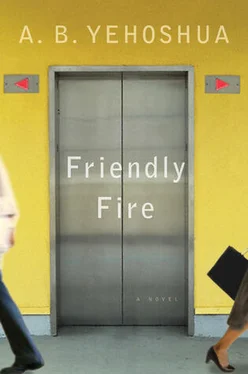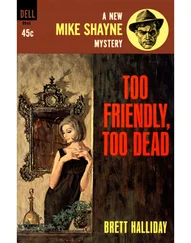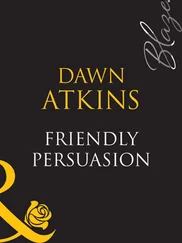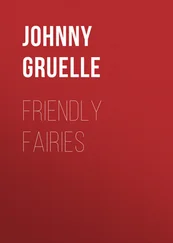Ya'ari looks at the photo hanging over Nofar's bed, Eyal as a teenager — a picture he hadn't known existed — and mumbles something about the source of his family's melancholy. But there's no need for any explanation, because the landlords have already heard about the tragedy in detail. Nofar talks again and again about the friendly fire — those are the words she uses. Now, the couple inquire of the father, How is it that such a story is so deeply embedded in her? How old was she at the time, anyway? Because it seems to them that she gets a bit confused about dates.
Very young, says the father, eleven and a half, in the middle of sixth grade. The age difference between her and her cousin was substantial, almost thirteen years. Eyal studied medicine at university under army auspices, but afterward she did not serve at the hospital, instead insisting on combat duty. If he were still alive, he would now be a doctor like you. But the age difference, Ya'ari adds with a bitter smile, did not prevent Nofar from imagining that not only was she in love with her cousin but also that he was in love with her. Maybe he sent off signals that we were unaware of but which made a strong impression on her, and possibly because of this, she remains stalled.
From the landlords' expression, the father senses he may have said too much. Because they love and respect their unhappy boarder, it's wrong for him to explain to them things that Nofar herself has not yet worked out. Now anxious to make a clean getaway, he checks his watch and looks for a piece of paper, but even such a minor thing as that is not easy to find in her room. He locates a prescription pad from the hospital, tears out a page and writes:
Nofar, my dear,
Grandpa made me come to Jerusalem to take care of an old elevator of some long-ago lover of his. So I thought if I was already here in your sad city, why not have coffee together? But I didn't remember that you're on duty this morning, so it turns out I'm missing you yet again. Moran is still stuck in the army, and Imma, till Sunday in case you've forgotten, is with Yirmi in Africa. Tonight I'm lighting candles at Efrat's. How about joining us? The kids will be happy. And Efrati, too, of course. It'll be less sad that way. So as usual I'm on my cell, waiting for a sign of life from you.
Kisses, Abba
He clears a space on the messy table and leaves the note in a conspicuous place. Then he looks again at the picture of the teenage boy and suddenly realizes that Nofar will not forgive him for invading her deepest privacy. He quickly resolves to erase his presence. He crumples the note and sticks it in his pocket, then goes out to the landlords, seated now in the kitchen with their baby, and when they invite him to join them, Ya'ari abashedly asks that they pretend he was never there. I know her well, he apologizes, she's sensitive about her independence, and it would be hard for her to accept that without warning I broke into her chaos. So please, don't tell her I was here. Don't tell her anything. I didn't leave a note. I'll call her later… that would be easier for her too. So thanks… and apologies… I'm sorry… I apologize… And without giving them a chance to regret his leaving, he departs.
Perhaps it is the easterly winds which arose overnight that boost his speeding car on the highway from Jerusalem to the coastal plain. To assuage his loneliness for his absent wife, he will have to settle for his father, whose admirable generosity of spirit has piqued his curiosity. So Ya'ari gets down to business and announces into the speakerphone:
"That's it, Abba, I was over at your lady friend's house."
"So what's going on with her?"
"Your elevator is great, and so's the little girl…"
"Watch it, Amotz, you are too clever by far."
8.
YIRMI RELAXES A bit, smiles and squeezes Daniela's shoulder, as if to heal the sting of his unexpected harangue and allay the anxiety of the old African who alerted him and now stands to one side, watching.
They return to the farm, and the old groundskeeper decides to defuse the family quarrel with a good meal. He fires the baking oven and kneads a big pita bread. Into a pot of boiling water he tosses roots and vegetable peelings, kernels of corn, and cubes of meat. Two other chefs rise from their cots in a nearby pantry and join in his labors. Meanwhile Yirmi, sitting opposite Daniela, is curious to know what drew his sister-in-law so strongly to the elephant that she went to see it a third time. But Daniela is not quite ready to lay bare her feelings to someone who has just scolded her in the presence of strangers, and instead of explaining what drove her to contemplate a spectacular genetic defect in search of primal human heartbreak, she needles her brother-in-law by telling him with childish pride about the hundred dollars she gave to the elephant's owner to remove the bandage.
"A hundred dollars? Are you out of your mind?"
It wasn't on purpose. Even though the money wasn't that much for her, she still has her limits. She'd been sure that all the bills she stuffed into her jacket pocket were small ones, because Amotz always held on to the big bills. It was only when she took out the money that she realized what it was, and by then it was too late; the man snatched it quickly and tucked it in his shorts and immediately complied with her request, and when the elephant crouched before her, its giant eye shed a tear, and then another.
"Tears? An elephant?"
That is what she saw with her own eyes. So how could she tell the owner, Wait, I made a mistake, ever since my sister's death I've been a little scattered, and by accident I gave you a hundred-dollar bill, but ten is enough for you, so give it back, please.
"He would also have been fine with one dollar."
"Who decides that one dollar is enough for him? You? On what basis?" she snaps at her brother-in-law. "Drop it, Yirmi, I actually like the idea that a hundred-dollar bill Amotz put in my purse should pass so naturally into the hands of this man, who might take better care of his elephant from now on."
"Which we will never know, but one thing is certain: you wrought a small revolution in the life of one African man, who will remember you always."
"It's nice to know that at least one man in Africa will think of me till the end of his life. One of these days, you'll be somewhere else."
"How do you know? Anything's possible… I owe nothing to anyone; I'm free as a bird."
"In which case, both you and the elephant's owner will remember I was here."
"I will? Why is that? All right, Shuli's love for you was always unconditional, even if you were an annoying child and tagged along with her and went into her room without knocking. But to remember? I'm here to forget, not to remember."
"What are you talking about?" she asks with trepidation.
"You know very well. I'm here not only to build up my pension but also to forget him and everyone who reminds me of him."
"Forget Eyali? How is that possible?"
"It's possible… why not? He is no longer anywhere, and I am still not a Sudanese who believes in winds and spirits."
"Why spirits? Is that the only way to talk about memory?"
"Memory is finished. I milked his death dry. You can't imagine how I investigated this death and everything I learned about it. But my responsibility is over. And if our Eyali — all of ours, yours too, why not? you also loved him very much — if this son happened to come back to life, believe me, I would say to him: My dear boy, bravo, you've managed to return to the world that had no pity for you, that took you by surprise and finished you off with two precise gunshots. But I ask you now, with all my love, please take pity on me and find yourself a different father."
Читать дальше












